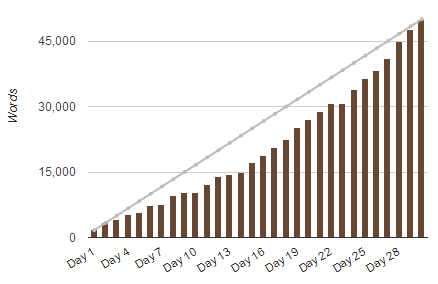
I won NaNoWriMo, barely. Scrivener said I had 50,140 words, but NaNoWriMo only gave me credit for 50,005 words, which I turned in on the night of the 30th. You might be surprised to know that I actually did "end" the story as well. I didn’t just stop writing.
I will freely admit that probably half or more of those words were "filler" words. Maybe a kinder way to put that would be "practice" words. The characters spent a great deal of time talking about the book itself and their roles in the book and how best they could advance the story. Sometimes there were characters from totally different stories wandering through to talk about their lives.
What lessons did I learn from this experience? Well, I learned that I can type pretty fast on a Macbook Air. That chicklet keyboard is kind of awesome in that regard. I learned that Scrivener for the Mac "feels" more polished than the Windows version. I learned that if I just pour words out of my brain onto the page, keeping my fingers typing no matter what, most of what comes out is confused nonsense not even related to the story, often in the form of characters bickering amongst themselves. But I can produce about 500 words in 10 minutes of such an outpouring.
Those are not particularly useful things to know, though. So:
Lesson 1. You have to start somewhere.
Something I re-learned again, for like the hundredth time, is that you won’t get anything done unless you sit down and write. Nearly every single day of November, I didn’t want to write. The first few days I was curious to see how this new story idea would turn out, but it quickly turned out that this new story idea was nowhere near ready to be written. I ran into plot problems big enough to drive a space freighter through by the second day. On top of that, my writing was dry, stilted, boring, and generally terrible.
It was very hard to continue writing on something that I knew was bad. And I’m not talking about the oh-that’s-just-your-insecurities-talking bad. I mean objectively, conclusively, definitively, not-even-remotely-publishable bad. But I made an astonishing discovery. No matter how much I didn’t want to write, if I sat down and started writing anyway, there was almost always a point when I stopped thinking "This story is stupid I don’t want to do this when will this torture end" and started thinking "oh cool maybe if I do this it won’t be so bad after all."
You would think it would be self-evident that one needs to write to overcome "writer’s block," but it’s a lesson that’s easy to forget, and it’s always a surprise to re-discover it.
Lesson 2. Keep writing sessions short.
Surprisingly, sitting down to write sixteen hundred words all at once is rather daunting when you are not in the mood for writing. So I came up with a simple little writing schedule in order to reduce the number of words I had to write in any given session. It involved short writing "sprints" and it went something like this:
Begin typing at the top of the hour. Set a word count goal of say 250 or 500 words, depending on how ambitious you feel. Something you can realistically do in 10-15 minutes. Stop when you reach that goal. Set an alarm for the bottom of the hour. Set it aside and do something that you want to do until the alarm goes off. At the bottom of the hour, begin typing again, setting another word count goal of 250 or 500 words. Keep repeating until you have a sufficient number of words for the day. Over the course of three or four hours, it adds up surprisingly fast.
There are two reasons I think this strategy worked for me. The first is that because the word count goal was small, it felt like the suffering I would have to endure was relatively short. The second reason it worked is that over the course of an hour or more, it didn’t "feel" like I had been doing an onerous chore, because I had also been doing something I enjoyed.
Lesson 3. Add a proxy character.
This is something that I think I will embrace in every first draft going forward. During NaNo, I inserted a silly character into the story who I called a plot demon. (I had done this once before in a draft that was dying and needed some ideas.) Whenever somebody said or did something that didn’t make sense, the plot demon would step in and tell everyone what they were doing wrong. If I didn’t know what to do next, the plot demon would step in and start a conversation among the characters about how they should advance the plot, or what they should have done differently in previous scenes.
I found it to be a great way to keep moving forward, and it kept the writing fun so it didn’t feel like I was on a death march during the parts where I wasn’t feeling inspired (in this case, the entire thing from start to finish). In a way, it relieved the burden of having to write a perfect draft. "I know I won’t be keeping this plot demon, so it’s okay to write whatever. It’s even okay to make a spelling mistake or two."
So those were the main things I learned this year. Now I’m in that post-NaNo December where it feels like there is a gigantic hole in my life. This year I am forcing myself to not write for a week or so. In previous years I’ve attempted to keep going in December and got burned out by the first of the year.
As for the story, it’s possible I might do another draft someday. It might still have some possibilities…